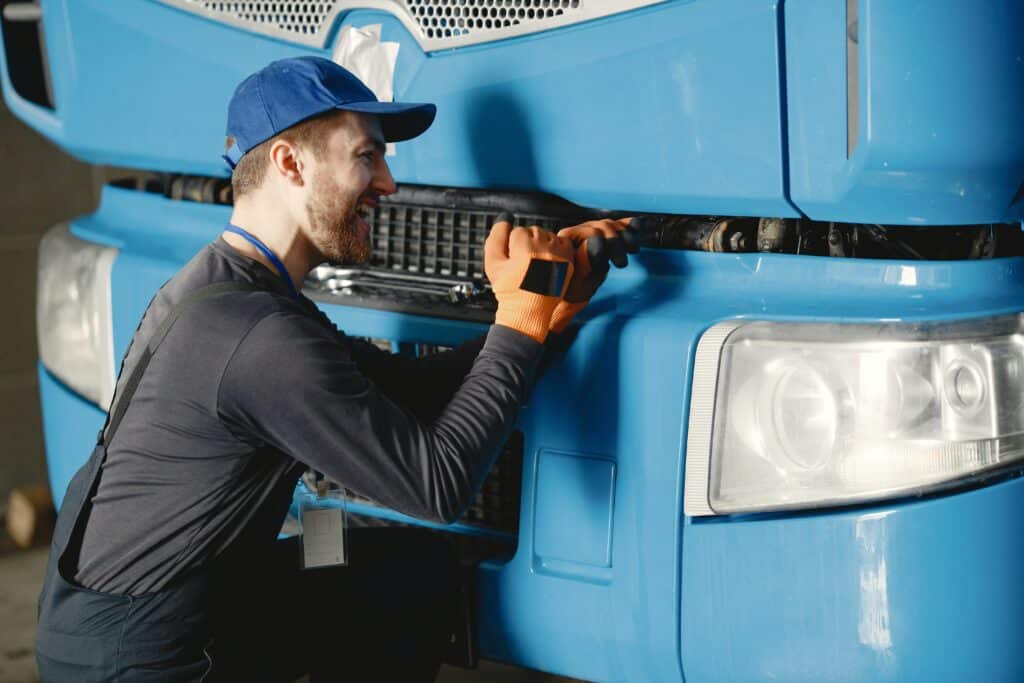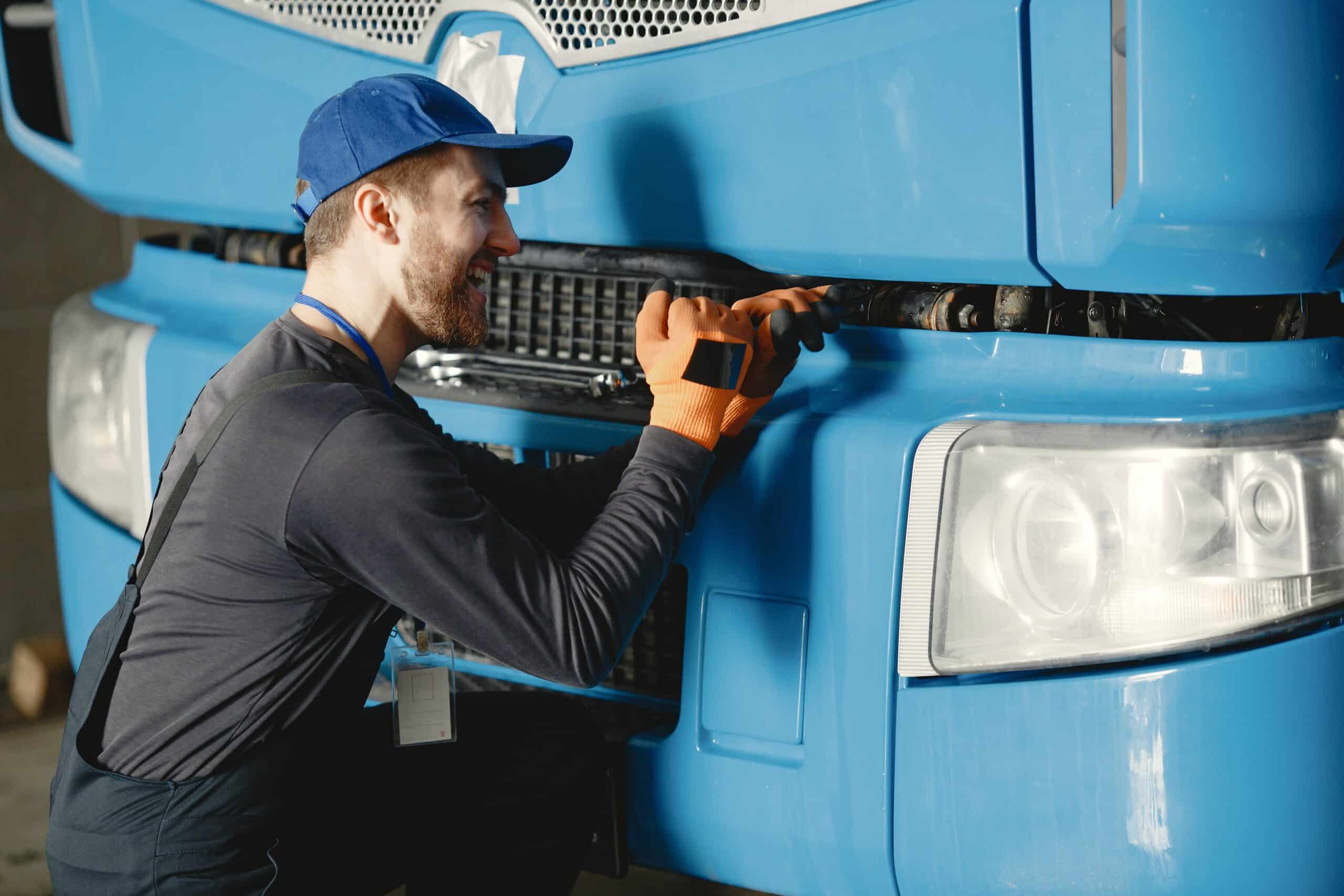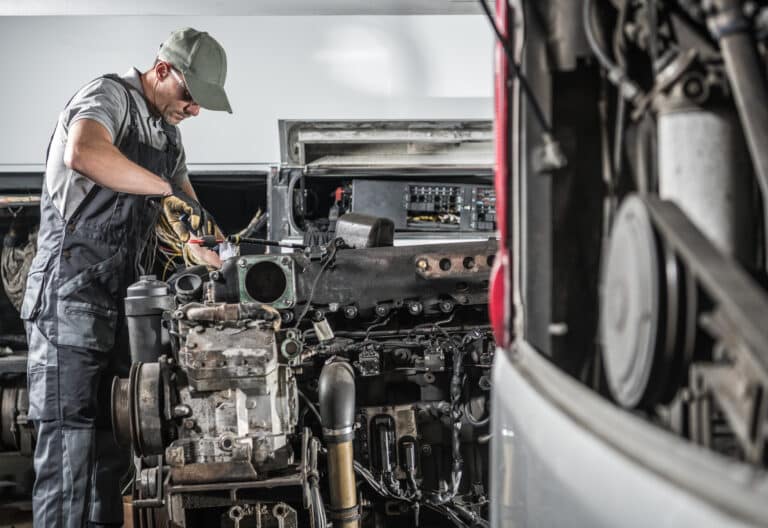If you are interested in pursuing a career as a diesel mechanic, you might have heard or know about the different types of diesel mechanics. One such type of diesel mechanic that we will discuss today is a heavy-duty diesel mechanic.

As the name suggests, a heavy duty diesel mechanic inspects, repairs, and maintains heavy equipment and machinery that generally run on diesel engines. This might involve heavy equipment such as semi-trucks and generators.
What Do Heavy-duty Diesel Mechanics Do?
Has this ever crossed your mind, what does a diesel mechanic do? The duties of a regular diesel mechanic and a heavy-duty diesel mechanic are somewhat similar, but some differences set them apart.
The general tasks of a heavy-duty mechanic can depend on the type of equipment or vehicle they work on, but the common day-to-day tasks usually include:
- Checking lighting systems of vehicles
- Maintenance and cleaning of equipment
- Performing diagnostic tests on machines and vehicles for compliance and performance
- Repairing brakes such as air brakes
- Repairing and diagnosing any faults within engines
- Organization and recording of serviced equipment and vehicles
- Replacing defective parts and components
- Fabrication and welding
- Interpreting flow charts and diagrams
- Maintenance of transmissions and heavy-duty truck drivetrains
If you’re interested in becoming a heavy-duty diesel mechanic, you should also bear in mind that being one involves a lot of physical activity.
This job usually requires a lot of standing, climbing, lifting heavy equipment, and walking for long hours. Hence, you will need to have physical strength and stamina to perform efficiently in this job role. (Read More: What is a Diesel Mechanic)
Unlike a Mobile Diesel Mechanic, as a heavy-duty mechanic, you’re generally working on-site in the shop.
Salary & Job Outlook for Heavy-Duty Diesel Mechanics
If you wish to enter this rewarding field, you might be wondering how much you can earn as a diesel mechanic. It is important to emphasize that, like any other profession, entry-level positions for a diesel mechanic also involve a lower salary than average.
According to a report by the U.S. Bureau of Labor Statistics (BLS), the national average salary for diesel mechanics was $48,690 and $23.41 per hour. The national average salary of any profession generally means that half of the people earn lesser than the figure, while the other half earn more. Growth for diesel mechanic jobs is also expected over the next 10 years.
It is also important to note that diesel technician salary is subject to change and are highly dependent on various influencing factors such as job location, experience, level of education, and the number of certifications.
You should also note that these figures are related to diesel mechanics in general, as there was no governmental data available for heavy-duty diesel mechanics in particular.

Job Skills & Requirements for Heavy-Duty Diesel Mechanics
Like in any other profession, employers looking to hire heavy-duty diesel mechanics also prefer their candidates to have a specific set of skills and educational requirements, such as:
Dexterity
Good hand-eye coordination is one of the most crucial traits required by diesel mechanics since their work is hands-on.
For instance, assembling and disassembling components within a vehicle or machinery will be difficult for someone who does not have decent hand-eye coordination.
Mechanical and Technical Proficiency
Good analytical skills are another set of traits that are important for a heavy-duty diesel mechanic. Since these technicians have to build as well as tear down engines, they should understand the basics and the general know-how of diesel mechanic tools and technical equipment.
A good wait to get technical proficiency is by enrolling yourself in diesel mechanic training. Choosing the right training sets a strong foundation.
Detail-Oriented
As a diesel mechanic, you will be required to have an eye for detail while working with engines. This is because heavy machinery and vehicles are generally complex and not easy to work on.
Plus, even small components of an engine, such as a bolt or a wire that is missing, can cause major concerns. Hence, being organized and having an eye for the little details is imperative.
Electrical Skills
Diesel mechanics, in general, should have decent knowledge and proficiency in dealing with computers and complex software programs.
Additionally, these have an understanding of the electrical components of a vehicle. Generally, a diesel mechanic school will help you develop these foundational skills.
Customer Service
Heavy-duty diesel mechanics often have to interact with customers and explain the diagnosed issues with vehicles or machinery. Hence, they are required to have good communication skills and patience to deal with the queries of customers.
Check out to find out more: Diesel Mechanic Requirements & Diesel Mechanic Job Description
How To Become a Heavy-Duty Diesel Mechanic?
If you are still here, you might be interested to know the process of becoming a heavy-duty diesel mechanic.
Like any other profession, it is important to have quality education and hands-on experience when looking for jobs in this industry.
Your first step in becoming a heavy-duty diesel mechanic is to complete your high school diploma or a GED. No specialized degrees are generally required for Diesel Techs.
Your next step is to enroll yourself in diesel mechanic training schools to learn the basics of this field. (Read More: how long is diesel mechanic school)

There are typically three main ways you can complete your diesel mechanic training, getting an associate’s degree from a university, getting a certificate from a vocational college or trade school, or getting online training from an accredited online program.
While opting for an associate’s diesel mechanic degree and a certification program are both reliable and secure ways of ensuring your employment, the most recommended is to choose an online program for your training.
This is because online programs offer several advantages over the other two options, such as
- They cost less
- You can learn at your pace and schedule
- You can complete your training faster. (Within months)
- Zero student-debt
After you complete your training program, you will be required to sit for the entry-level Automotive Service Excellence (ASE) certifications.
Having a few diesel mechanic certifications under your belt is always recommended.
An ASE certification is highly beneficial while applying for jobs within the industry and is also highly preferred by employers. Beginners can go for G1 certification, and having that on your resume can also help you land a Diesel Mechanic Apprenticeship.





